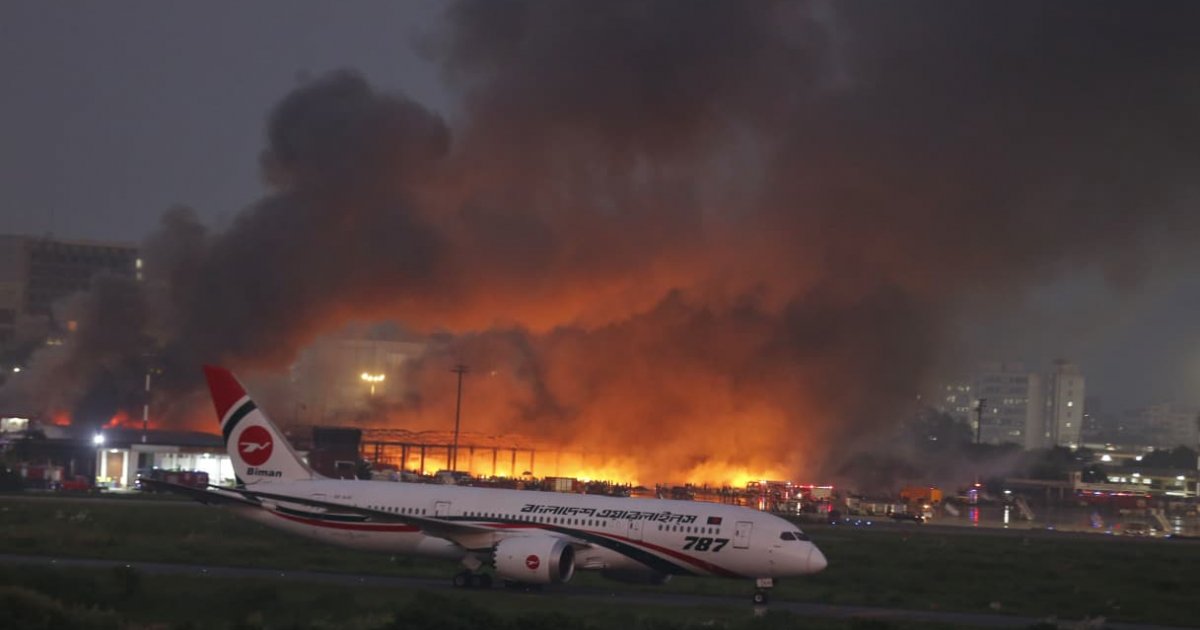The terrible fire at the import cargo village of the capital’s Hazrat Shahjalal International Airport could not only damage goods worth crores of taka but also the country’s overall trade and export activities—the logistics chain of imports. The fire at this important airport-based location has raised new questions about Bangladesh’s foreign trade security and infrastructural capacity.
The airport’s cargo village is the main hub for air cargo transportation, import, and export. Thousands of tons of goods come into the country and go abroad from here every day. Ready-made garments, electronic components, medicines, agricultural products, flowers, and high-value courier parcels—all types of goods are temporarily stored in this village.
As a large part of these goods was burnt or damaged in the fire, the shipments of hundreds of organizations and buyers have been directly affected. An airport authority official, who did not want to be named, said: “It is not just the loss of goods; the entire supply chain has been paralyzed. If cargo handling is stopped, trade worth crores of taka will be stuck every day.
It is being estimated that the loss in this incident is not less than several hundred crores in Taka. However, the country’s export confidence and logistics capacity are suffering more than this.
RMG suffers the most
Entrepreneurs in the readymade garment (RMG) industry say that garments sent by air are usually very urgent orders, where time is the biggest factor.
“If a shipment is delayed by 24 hours, sometimes the entire order is canceled,” said a director of the BGMEA.
Such delays can damage the reputation of not only the factory but the entire sector, he added.
Mohammad Hatem, president of the Bangladesh Knitwear Manufacturers and Exporters Association (BKMEA) and the Exporters Association of Bangladesh (EAB), said: “Such an accident in a sensitive place like Cargo Village is unacceptable. We have been complaining for a long time—the products are kept in the open, and there is no security.
According to him, the recent fire incidents in garment factories, one after another—Mirpur, Chittagong EPZ, and now the airport—have created deep concerns about security among export entrepreneurs.
“Whether this is a mere accident or part of some other sabotage—it needs to be investigated now,” he further said.
Impact
The concerned organizations have already sent letters to their members asking for a list of damaged products in the prescribed format. They say that it will be possible to get the real picture of the damage within a day or two.
RMG and perishable agricultural products such as vegetables, fruits, betel leaves, and various other items are usually exported from the country by air. Besides, the exchange of small packages and documents through international courier services has also stopped.
Bangladesh Garment Manufacturers and Exporters Association (BGMEA) president Mahmud Hasan Khan told Bangla Tribune: “The extent of damage to goods is not yet known. However, on average, 200-250 factories export goods by air every day. Accordingly, a significant number of factories may be affected.”
“If the airport is opened quickly, it is possible to reduce the damage to some extent. But if it is closed for a long time, exporters will face huge losses.”
Bangladesh Vegetable and Agricultural Products Exporters Association (BFVAPEA) president SM Jahangir Hossain said: “Since it is a perishable product, we want air traffic to start soon. Many products in the pipeline are at risk of spoiling due to the airport’s standstill.”
Trade organizations say that import-export activities worth more than a billion dollars could be negatively affected directly and indirectly.
Kabir Ahmed Khan, president of the International Air Express Association of Bangladesh, told Bangla Tribune: “The direct loss cannot be estimated right now, but we fear that it will affect commercial activities worth more than a billion dollars.”
Fazle Shamim Ehsan, executive president of BKMEA, said the same.
“This incident will not only result in the burning of goods, but also in various losses such as cancellation of orders due to non-availability of raw materials, failure to deliver samples on time, sale at a discount, and sending products at an additional cost.”
He also said that a small entrepreneur may have lost thousands of dollars’ worth of goods, but due to this, exports worth hundreds of thousands of dollars may be stopped. Such a loss will not be possible for many people to handle.”
BGMEA vice-president Md Shehab Udduza Chowdhury said: “Many of our members had their goods in Cargo Village. We have asked everyone to send information to know the exact extent of the damage.”
Importers suffer
Importers have also been equally affected by the Cargo Village fire. There were shipments of pharmaceutical raw materials, industrial machinery, mobile and electronic products, food, and fruits.
If these products are damaged, they have no alternative but to file an insurance claim, which takes months to settle.
Traders fear that the burden of this loss will also fall on the general consumer through an increase in import costs and market prices.
If the supply chain of medicines and food products is disrupted, there may be shortages in the domestic market.
According to experts, if the airport’s safety standards are questioned, Bangladesh’s rating with the International Civil Aviation Organization or with private airlines could drop.
This could increase both cargo handling costs and insurance premiums, which would reduce the competitiveness of exporters in the long run.
Potential economic losses
The annual financial value of Bangladesh’s airport-based import and export goods is about $25 billion.
Around 1,500 to 2,000 tonnes of goods move through Hazrat Shahjalal International Airport alone daily. If the Cargo Village’s operations are disrupted for three to five days, its direct economic losses could be between Tk300 and Tk500 crore.
An economist at the Bangladesh Institute of Development Studies (BIDS) told Bangla Tribune: “Not only product losses, but also export cancellations, import delays, insurance costs, and logistics costs can add up to Tk1,000 crore.”
Fire pattern
Earlier, on October 14, 16 workers died in a terrible fire at a printing and chemical godown in Rupnagar, Mirpur, in the capital.
Two days later, on October 16, a fire at Adams Caps and Textiles Limited in the Chittagong Export Processing Zone (CEPZ) caused a loss of at least Tk200-Tk250 crore.
Now, with another terrible fire at the airport’s Cargo Village, all in all, the industrial sector seems to be plunged into one disaster after another.
An industrial entrepreneur at the Chittagong EPZ said: “Every hour of production being stopped costs several lakhs of taka. If machines and fabrics are burnt, it takes months to recover. As a result, not only the factory but also the entire export chain is affected.
Economist Prof Selim Raihan, executive director at Sanem, said: “The biggest risk now is the disruption of production continuity. On the one hand, political and economic uncertainty, and on the other hand, accident after accident—all of these factors are putting a major strain on the export sector’s recovery process.”
A BGMEA official said: “The impact of three consecutive major fires will not only be limited to the factory level; it will also affect the decisions of foreign buyers. They may turn to alternative sources.’
Economists say such accidents can also hit investor confidence, especially at a time when the country is on the road to recovery after political changes.
Experts say the most urgent thing now is to prepare a damage inventory, arrange alternative cargo handling systems, and quickly settle insurance claims.
At the same time, modern firefighting systems, digital monitoring, and security protocols need to be reorganized in the cargo village.
Economists believe that as fragile as Bangladesh’s trade flow is now, a series of fires is putting pressure on the economy on multiple fronts—production, exports, confidence, and investment—in all areas.



